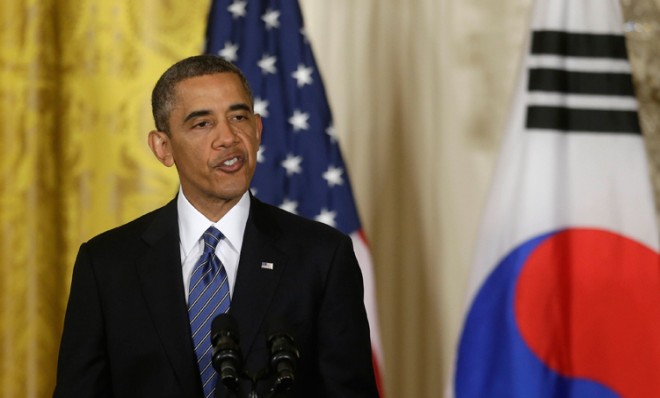North Korea: Is the crisis over?
Pyongyang appears to be pulling back its missiles and rhetoric

A free daily email with the biggest news stories of the day – and the best features from TheWeek.com
You are now subscribed
Your newsletter sign-up was successful
Remember North Korea? It's the country that, as recently as last month, was rattling a nuclear saber loud enough to keep the American military on edge.
Now, with South Korean President Park Geun Hye visiting the United States — presenting a perfect opportunity for the Hermit Kingdom to own the spotlight — it appears the Stalinist regime has come down with a case of cold feet.
To be sure, hours before a meeting between Park and President Barack Obama, Pyongyang issued its customary stream of bellicose rhetoric, saying it would "take immediate counteractions in case even a single shell drops over the territorial waters of our side" during joint U.S.-South Korean naval drills.
The Week
Escape your echo chamber. Get the facts behind the news, plus analysis from multiple perspectives.

Sign up for The Week's Free Newsletters
From our morning news briefing to a weekly Good News Newsletter, get the best of The Week delivered directly to your inbox.
From our morning news briefing to a weekly Good News Newsletter, get the best of The Week delivered directly to your inbox.
But Obama didn't seem too fazed. "The days when North Korea could create a crisis and elicit concessions, those days are over," he said during a joint press conference with Park.
Even the country's threat to "take immediate counteractions" is positively mild compared to recent claims that it would turn Seoul into "a sea of fire."
And leader Kim Jong Un has taken concrete steps to put the world at ease. Despite its rhetoric, North Korea has withdrawn two of its mid-range missiles from the country's east coast, a move U.N. Secretary General Ban Ki Moon's office called "a step in the right direction."
George Little, press secretary for the Department of Defense, called the current situation a "provocation pause," adding:
A free daily email with the biggest news stories of the day – and the best features from TheWeek.com
Historically, North Korea's going through cycles of provocations [that] then come to an end. That's been helpful. And we do think that they probably heard very loudly from us, and from others, the need to ratchet it back and to lower the temperature. [ABC News]
Pyongyang could be reacting to pressure from China, its strongest ally and neighbor. On Tuesday, the Bank of China shut down the account of North Korea's main foreign exchange bank, which was hit by U.S. sanctions after North Korea's third nuclear test, according to Reuters.
It's an important development because it indicates that China is willing to back up its tough talk against North Korea. China is also North Korea's largest trading partner, responsible for $6 billion in trade, according to Reuters.
While the situation seems to be improving, there are still signs of tension — including the sentencing of American citizen Kenneth Bae to 15 years of hard labor for "hostile acts."
Pyongyang takes American hostages because it "knows Washington will negotiate for their release and ultimately provide something of value," like the veneer of legitimacy that a visit by a high-ranking U.S. official would provide, writes Gordon Chang at The Daily Beast.
There is also the problem of the industrial park in the North Korean border town of Kaesong, one of the few symbols of economic cooperation between the North and South. On Friday, the last remaining South Korean workers left the facility, essentially cutting the last economic bond between the two countries, reports The New York Times.
"It's premature to make a judgment about whether the North Koreans' provocation cycle is going up, down, or zigzagging," Daniel Russel, senior director for Asian affairs at the National Security Council, told the South China Morning Post. "The decision to launch or not launch missiles, to conduct a provocation or to stand down or defer it, is a decision that rests with the North Koreans."
Keith Wagstaff is a staff writer at TheWeek.com covering politics and current events. He has previously written for such publications as TIME, Details, VICE, and the Village Voice.
-
 Political cartoons for February 14
Political cartoons for February 14Cartoons Saturday's political cartoons include a Valentine's grift, Hillary on the hook, and more
-
 Tourangelle-style pork with prunes recipe
Tourangelle-style pork with prunes recipeThe Week Recommends This traditional, rustic dish is a French classic
-
 The Epstein files: glimpses of a deeply disturbing world
The Epstein files: glimpses of a deeply disturbing worldIn the Spotlight Trove of released documents paint a picture of depravity and privilege in which men hold the cards, and women are powerless or peripheral